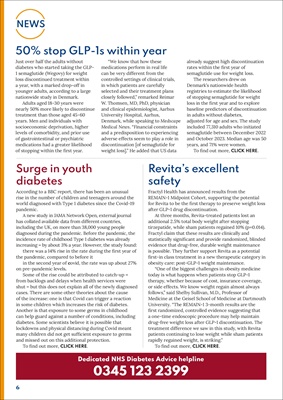
6
NEWS
50% stop GLP-1s within year
Just over half the adults without
diabetes who started taking the GLP1 semaglutide
(Wegovy) for weight
loss discontinued treatment within
a year, with a marked drop-off in
younger adults, according to a large
nationwide study in Denmark.
Adults aged 18-30 years were
nearly 50% more likely to discontinue
treatment than those aged 45-60
years. Men and individuals with
socioeconomic deprivation, higher
levels of comorbidity, and prior use
of gastrointestinal or psychiatric
medications had a greater likelihood
of stopping within the first year.
"We know that how these
medications perform in real life
can be very different from the
controlled settings of clinical trials,
in which patients are carefully
selected and their treatment plans
closely followed," remarked Reimar
W. Thomsen, MD, PhD, physician
and clinical epidemiologist, Aarhus
University Hospital, Aarhus,
Denmark, while speaking to Medscape
Medical News. "Financial constraints
and a predisposition to experiencing
adverse effects seem to play a role in
discontinuation [of semaglutide for
weight loss]." He added that US data
already suggest high discontinuation
rates within the first year of
semaglutide use for weight loss.
The researchers drew on
Denmark's nationwide health
registries to estimate the likelihood
of stopping semaglutide for weight
loss in the first year and to explore
baseline predictors of discontinuation
in adults without diabetes,
adjusted for age and sex. The study
included 77,310 adults who initiated
semaglutide between December 2022
and October 2023. Median age was 50
years, and 71% were women.
To find out more, CLICK HERE.
Revita's excellent
safety
Fractyl Health ha announced results from the REMAIN-1
Midpoint Cohort, supporting the potential for Revita to
be the first therapy to preserve weight loss after GLP-1
drug discontinuation.
At three months, Revita-treated patients lost an
additional 2.5% total body weight after stopping
tirzepatide, while sham patients regained 10% (p=0.014).
Fractyl claim that these results are clinically and
statistically significant and provide randomized, blinded
evidence that drug-free, durable weight maintenance
is possible. They further support Revita as a potential
first-in class treatment in a new therapeutic category in
obesity care: post-GLP-1 weight maintenance.
"One of the biggest challenges in obesity medicine
today is what happens when patients stop GLP-1
therapy, whether because of cost, insurance coverage,
or side effects. We know weight regain almost always
follows," said Shelby Sullivan, M.D., Professor of
Medicine at the Geisel School of Medicine at Dartmouth
University. "The REMAIN-1 3-month results are the
first randomized, controlled evidence suggesting that
a one-time endoscopic procedure may help maintain
drug-free weight loss after GLP-1 discontinuation. The
treatment difference we saw in this study, with Revita
patients continuing to lose weight while sham patients
rapidly regained weight, is striking."
To find out more, CLICK HERE.
Surge in youth
diabetes
According to a BBC report, there has been an unusual
rise in the number of children and teenagers around the
world diagnosed with Type 1 diabetes since the Covid-19
pandemic.
A new study in JAMA Network Open, external journal
has collated available data from different countries,
including the UK, on more than 38,000 young people
diagnosed during the pandemic. Before the pandemic, the
incidence rate of childhood Type 1 diabetes was already
increasing - by about 3% a year. However, the study found:
there was a 14% rise in the rate during the first year of
the pandemic, compared to before it
in the second year of covid, the rate was up about 27%
on pre-pandemic levels.
Some of the rise could be attributed to catch-up -
from backlogs and delays when health services were
shut - but this does not explain all of the newly diagnosed
cases. There are some other theories about the cause
of the increase: one is that Covid can trigger a reaction
in some children which increases the risk of diabetes.
Another is that exposure to some germs in childhood
can help guard against a number of conditions, including
diabetes. Some scientists believe it is possible that
lockdowns and physical distancing during Covid meant
many children did not get sufficient exposure to germs
and missed out on this additional protection.
To find out more, CLICK HERE.
Dedicated NHS Diabetes Advice helpline
0345 123 2399